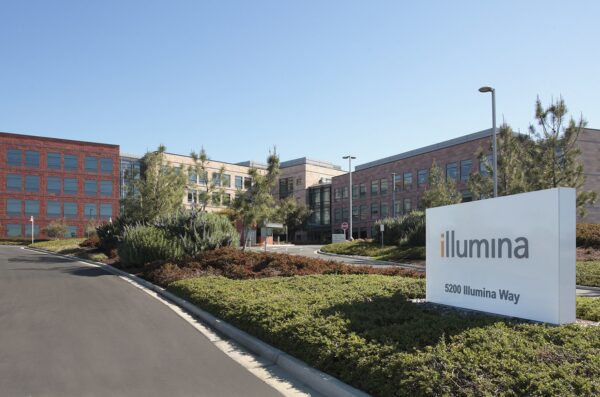
Illumina is done fighting in the courts to keep cancer-detection company Grail.
The gene-sequencing giant had previously pledged to divest Grail if it did not win either the U.S. or European appeals of anti-trust cases challenging the acquisition. A U.S. appeals court came down against the Federal Trade Commission’s case on Friday, but in a narrow way that hardly handed Illumina a clear victory. After reviewing the decision, Illumina said Sunday that it has decided against further litigation. The company will divest Grail.

With the Rise of AI, What IP Disputes in Healthcare Are Likely to Emerge?
Munck Wilson Mandala Partner Greg Howison shared his perspective on some of the legal ramifications around AI, IP, connected devices and the data they generate, in response to emailed questions.
The planned divestiture is the latest step in a journey that started within Illumina. Grail began as research within the San Diego company. Grail spun out in 2017, free to raise money on its own and pursue development of its multicancer early detection technology. This test screens for multiple types of cancer from a small blood sample in what’s called a liquid biopsy. Illumina retained a small equity stake in Grail.
In 2020, Illumina announced a $7.1 billion deal to reacquire Grail, which was approaching commercialization of its test, named Galleri. The deal prompted anti-trust inquiries from the FTC and the European Commission. Illumina went ahead and closed the acquisition before receiving regulatory clearances, a move that prompted European regulators to levy the maximum fine for breaching European merger rules.
Illumina maintained that the European Commission did not have jurisdiction over a transaction between two U.S. companies. While Galleri has been commercialized in the U.S. and the U.K., it is not available in the European Union. Meanwhile, the FTC’s case contended that Illumina, as the provider of gene-sequencing equipment and reagents used by other cancer test companies, would have pricing power over Grail’s competitors. Illumina tried to address that concern by pledging to offer all oncology companies the same access and pricing for its next-generation sequencing (NGS) services that it provided to Grail.
The U.S. Fifth Circuit of Appeals’ decision Friday said the plain language of the Clayton Antitrust Act only prohibits transactions that substantially lessen competition. In the case, number 23-60167, the court said the FTC held Illumina to a higher standard of eliminating its ability to favor Grail and harm Grail’s rivals. The court’s 36-page decision vacates the FTC’s order and sends it back for reconsideration under the proper standard. Despite this conclusion, the court still agreed broadly with the FTC’s conclusion that the acquisition would lessen competition in an emerging multicancer early detection market in which Grail is the first with a multicancer early detection test, but with several competitors at its heels.
“To create and eventually sell this product, each developer will need access to one critical input—NGS platforms,” the court said. “Now, the sole supplier of that input—Illumina—has purchased the first mover in this nascent industry. Given Illumina’s monopoly power and shifting business priorities, it was reasonable for the Commission to conclude that Illumina would likely foreclose against Grail’s competitors—even at the expense of some short-term profits—to pursue its long-term goal of establishing itself (via Grail) as the market leader in clinical testing.”
The Grail acquisition drew the ire of activist investor Carl Icahn. He noted Illumina’s share price has fallen 75% since the deal was announced with nothing to show for it but $4.7 billion in impairment charges and a €432 million (about $476 million) European Commission fine. Icahn pushed for changes to the board of directors and company management. The proxy fight led to shareholders voting out board chairman John Thompson; CEO Francis deSouza resigned in July. Former Agilent Technologies executive Jacob Thaysen was appointed Illumina’s new CEO in September.
In a letter sent to Illumina shareholders on Monday, Icahn welcomed the divestiture announcement but criticized legacy board members who “sat idly by as the core business deteriorated under prior CEO Francis deSouza.” Icahn, who is suing the company to get more information about the Grail transaction, contends that board members who oversaw the deal are “conflicted” and may put their concern about personal liability ahead of what’s best for Illumina.
“Why do Illumina’s stockholders need to be beholden to the legacy conflicted directors?” Icahn wrote. “Put simply, the fox should not guard the henhouse.”
Illumina said the Grail divestiture will happen as a sale to another company or a spinout as an independent company. The European Commission’s October divestiture order specified that Illumina must provide Grail with cash to support its cancer detection test.
One possibility for Grail raising capital is an IPO, an option that the cancer test company was exploring prior to the Illumina acquisition. But the financial markets are quite different now. The wide open IPO window of 2020 has been closed to most life science companies for the past two years. Illumina said it expects to finalize the terms of the divestiture by the end of the second quarter of 2024.
Photo by Illumina














